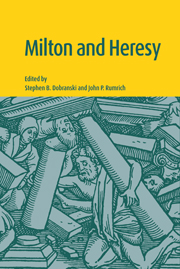Book contents
- Frontmatter
- Contents
- List of contributors
- Acknowledgments
- Abbreviations
- Introduction: Heretical Milton
- PART I HERETICAL THEOLOGY
- PART II HERESY AND CONSEQUENCES
- 4 Milton's Arianism: why it matters
- 5 “Elect above the rest”: theology as self-representation in Milton
- 6 Milton's kisses
- PART III HERESY AND COMMUNITY
- PART IV READERS OF HERESY
- Index
5 - “Elect above the rest”: theology as self-representation in Milton
Published online by Cambridge University Press: 10 October 2009
- Frontmatter
- Contents
- List of contributors
- Acknowledgments
- Abbreviations
- Introduction: Heretical Milton
- PART I HERETICAL THEOLOGY
- PART II HERESY AND CONSEQUENCES
- 4 Milton's Arianism: why it matters
- 5 “Elect above the rest”: theology as self-representation in Milton
- 6 Milton's kisses
- PART III HERESY AND COMMUNITY
- PART IV READERS OF HERESY
- Index
Summary
In May of 1619, the Synod of Dort, defending orthodox Calvinist teaching on predestination and election, warned against “curiously scrutinizing the deep and mysterious things of God.” That same year, perhaps the same month or day, the ten-year-old John Milton sat for a portrait, his closely cropped hair a visible sign, his widow would tell John Aubrey years later, of the influence of his Puritan teacher, perhaps the Calvinist Thomas Young. Whatever the principles instilled by Young, Milton would become the kind of curious scrutinizer rebuked by the Synod, and he would come to echo the Arminian or Remonstrant doctrines of universal and sufficient grace that the Synod condemned. Impatient with mystery, he would not balk at skeptically probing divine justice; instead he would reject the Calvinist claim that divine justice is inscrutable and unquestionable. God's actions are subject to rational scrutiny and approval, because they conform to accessible standards of reason. Freed from its equivocating context, Milton would subscribe to the aphorism he authors upon Satan, “Not just, not God.” Though Calvinists denounced as sinfully presumptuous attempts to subject God's justice to rational evaluation, Milton was confident that, aided by the Spirit, he could draw out this leviathan with the hook of his reason.
Readers from his time to ours have agreed that Milton attempts to recast the biblical story on rational lines; on his success, though, at least in Paradise Lost, the jury is still out. Andrew Marvell recognized the implications of Milton's great argument, worried that Milton would “ruin … / The sacred Truths,” but concluded by endorsing his friend and colleague's claim of prophetic status.
- Type
- Chapter
- Information
- Milton and Heresy , pp. 93 - 116Publisher: Cambridge University PressPrint publication year: 1998
- 9
- Cited by



